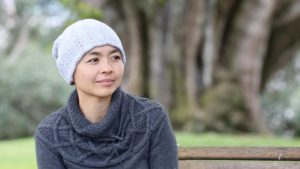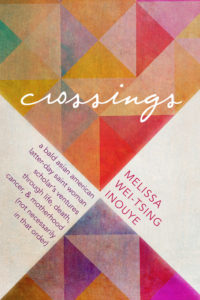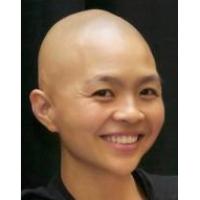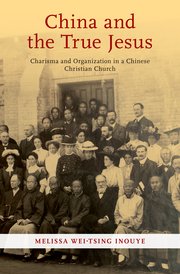
Melissa Wei-Tsing Inouye introduces her new book, Crossings: A Bald Asian American Latter-day Saint Woman Scholar’s Ventures through Life, Death, Cancer & Motherhood (Not Necessarily in that Order), which is being published this week by Deseret Book and the BYU Maxwell Institute.
Being a bald Asian woman is great, especially at interfaith gatherings. People assume I’m Buddhist. As they approach, I can feel all sorts of enlightened, urbane appreciations welling up in them. Then I introduce myself as a Latter-day Saint. “Oh!” they exclaim. “You don’t look Mormon!”
 I hope that my book, Crossings, will expand notions of what a Latter-day Saint life looks like. It is a compilation of memoir, essay, personal letters, and university lectures that show the varied textures and traces of this highly practical faith. One person’s life, of course, cannot be “representative” or “typical” of an entire religious tradition. But I do hope that it gives the reader a purchase on Latter-day Saint practice beyond official policies, press releases, and prescriptions from the pulpit. A view informed entirely by such sources is not inauthentic, but it is incomplete. The Church is mostly not church. Mostly, it is what people do in their everyday lives and relationships.
I hope that my book, Crossings, will expand notions of what a Latter-day Saint life looks like. It is a compilation of memoir, essay, personal letters, and university lectures that show the varied textures and traces of this highly practical faith. One person’s life, of course, cannot be “representative” or “typical” of an entire religious tradition. But I do hope that it gives the reader a purchase on Latter-day Saint practice beyond official policies, press releases, and prescriptions from the pulpit. A view informed entirely by such sources is not inauthentic, but it is incomplete. The Church is mostly not church. Mostly, it is what people do in their everyday lives and relationships.
Writing Crossings was easy, for a number of reasons. First, I had the looming deadline of possible imminent physical demise. (I never thought cancer would be good for anything, but it was.) Second, I didn’t write all of it from scratch. Much of it was simply gathered together from pieces stored on my computer or letters stashed in a filing cabinet. Third, the storms arising from church cultural climate change were constantly raging. People were always saying things, and responses kept forming in my head—especially when I thought about how I would explain my position to my kids. One is never at a loss for things to say to one’s children.
 One thing that makes Crossings a bit different as a memoir is its mixed-media format. Some might say that this mixed-media format results in shifting audiences, defocusing the book’s message. I recognize that this is a potential problem. At the same time, I feel that Latter-day Saint life, and certainly life itself, resists rigid segmentation. People pass through many different phases and roles. We are teachers and students, receivers and proclaimers, conservative and liberal, parochial and cosmopolitan, all at the same time.
One thing that makes Crossings a bit different as a memoir is its mixed-media format. Some might say that this mixed-media format results in shifting audiences, defocusing the book’s message. I recognize that this is a potential problem. At the same time, I feel that Latter-day Saint life, and certainly life itself, resists rigid segmentation. People pass through many different phases and roles. We are teachers and students, receivers and proclaimers, conservative and liberal, parochial and cosmopolitan, all at the same time.
There are many letters in Crossings. I’ve loved writing letters ever since I was a little girl in Southern California, corresponding with my cousins in far-away Utah. I love letters for their materiality and long-journeying. When I was a missionary in Tainan, Taiwan, I woke up at 4 a.m. on P-Day to read letters from my family. My mother wrote me faithfully every week. I remember sitting on the slightly sticky faux leather couch in the early morning light, opening the envelope, savoring the voices and scenes from life at home. After reading my letters, I would pull out an old manual typewriter and respond. Tap tap tap, tap tap tap. I told my family about investigators we’d taught that week, noodles and boba drinks, and riding a bike on the paths between the green rice paddies.
The most beautiful thing about a letter is that it is written for an audience of one—a simple communication on a single piece of paper. What happens when one takes a letter out of this private context and publishes it before a public audience, as I have done in Crossings? I’ve thought about this for a long time. One of the reasons for writing this book was to make sure my words reached my children as adults, far into the future. I’ve seen how papers in our family filing cabinet get lost. (Actually, in our house it seems everything gets lost.) I wanted to make sure they had something permanent, substantial, and redundant. So I made this literary lifeboat. God willing, I will have many more years to write new letters to the Bean, Sprout, Leaf, and Shoot, and will always be on hand to tell my children where I have filed them.
Another way of thinking about letters is that their original audience of one creates an opportunity for candid reflections that can be useful for more than one person. As a historian, I see how letters and other private communications can gradually come to have a broader audience of those who, though not the original recipient, are personally invested in the conversation. I’ve learned a lot about people by reading their letters. It is a way of being present with someone, a way of seeing what they see and feeling what they love.
This book is, in a way, a love letter not only to my family but also to my sisters and brothers—the Latter-day Saints who throughout my life have taught and led me, disappointed and inspired me. One is hardest on those one loves most, and one loves most those things that are hardest.
 Melissa Wei-Tsing Inouye is a senior lecturer in Asian studies at the University of Auckland. She received her PhD in Chinese history from Harvard University. Dr. Inouye’s research includes the history of Chinese Christianity, moral ideology in modern China, global charismatic religious movements, and women and religion. Her book China and the True Jesus: Charisma and Organization in a Chinese Christian Church was published by Oxford University Press in January 2019.
Melissa Wei-Tsing Inouye is a senior lecturer in Asian studies at the University of Auckland. She received her PhD in Chinese history from Harvard University. Dr. Inouye’s research includes the history of Chinese Christianity, moral ideology in modern China, global charismatic religious movements, and women and religion. Her book China and the True Jesus: Charisma and Organization in a Chinese Christian Church was published by Oxford University Press in January 2019.
A member of the advisory board of the Neal A. Maxwell Institute for Religious Scholarship at Brigham Young University, Dr. Inouye is committed to the mutually reinforcing relationship between faith and learning. Her writings on Latter-day Saint life and faith have been published online and in print in Patheos, the Washington Post, Meridian Magazine, Square Two, and the Ensign. She and her husband, Joseph, have four noisy and joyful children, botanically nicknamed Bean, Sprout, Leaf, and Shoot.
Please also see Melissa’s 2015 Church History Library “Pioneers in Every Land” presentation: “China, Japan, and Utah: The Transnational Passages of a Mormon Family.”
